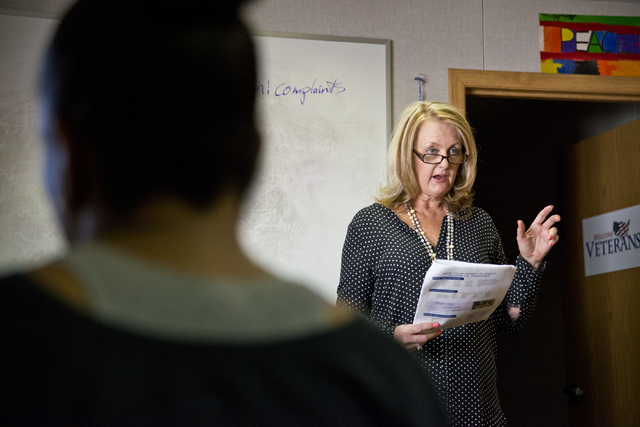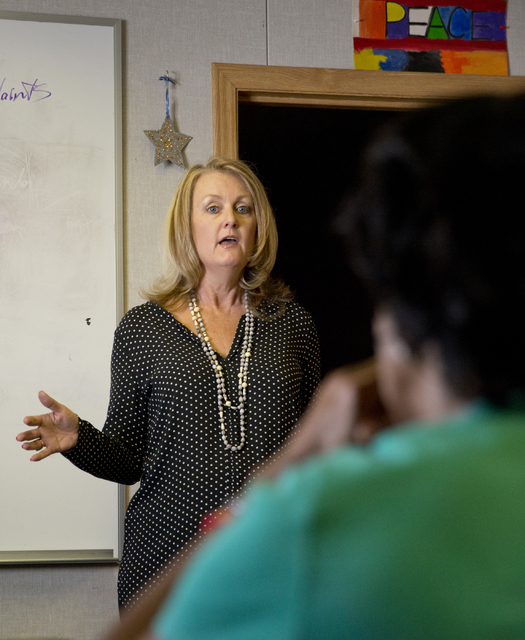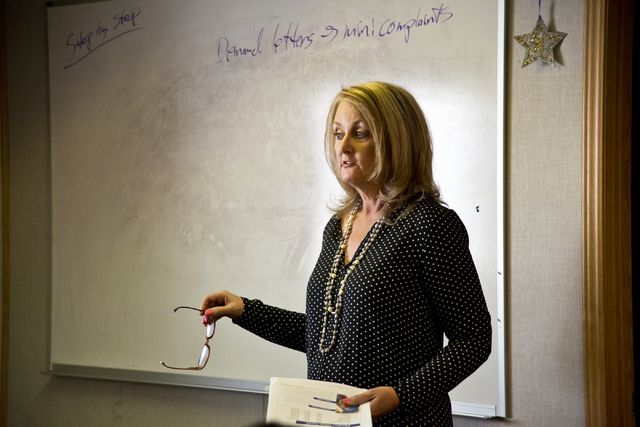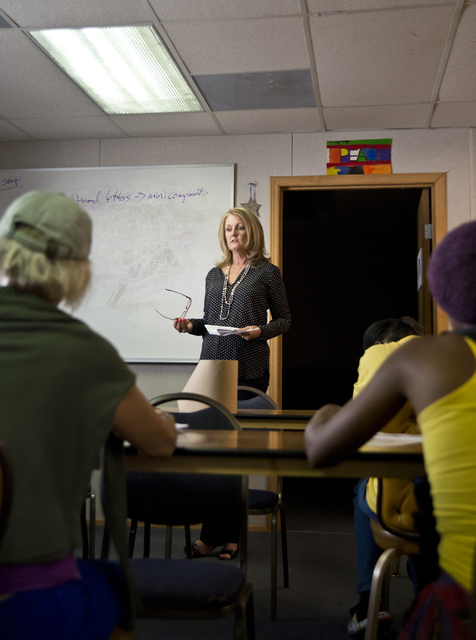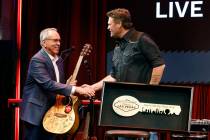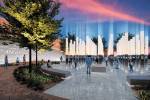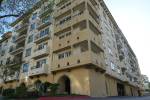Domestic violence victim advocates in Las Vegas advise how to exit an abusive relationship
All morning in her head, Julie Ferrari kept telling herself, “You could go to a shelter.”
Though the violence had escalated in her marriage over the last year, she wasn’t sure how she finally arrived at the thought of going to a domestic violence shelter.
“In the back of my mind, I knew I was going to do this,” she said. “I took the step to call, so I knew it’s what I wanted to do.”
An estimated 20 million men and women per year are physically abused by an intimate partner, according to the National Coalition Against Domestic Violence (NCADV) — this equates to an average of about 20 people per minute. Oftentimes, they don’t know where to go and who can help.
In Las Vegas and Henderson, there are places such as SAFE House, Safe Nest and the Shade Tree that provide women with shelter while they plan their next steps and partner them with resources along the way.
Annette Scott, community development and education coordinator at Henderson-based SAFE House, 921 American Pacific Drive, Suite 300, said while the organization gets about 800 people a year in its shelter, it offers other services to survivors.
“A bulk of our services is outreach,” she said.
Whether or not survivors are staying in the shelter, they can access counseling for themselves and their children — this includes drug and alcohol therapy if needed.
Once a person comes in for services, Scott said the shelter can help people with anything from obtaining birth certificates and passports to housing and job assistance. If the survivors are unable to get some of these items, such as identification, SAFE House can help them get new paperwork.
There is even legal advocacy, in which people from the Legal Aid Center of Southern Nevada, 725 E. Charleston Blvd., offer services.
Because there might be other needs survivors have, such as access to food and clothing, Scott said SAFE House tries to partner with other community agencies for anything it can’t provide.
Hannah Brook, director for community & donor relations for Safe Nest, 2915 W. Charleston Blvd., Suite 12, said the shelter has services that can help survivors come up with a safety plan for leaving. But even with a plan in place, Brook said only the victim really knows when it’s time to leave.
“(They) know when it’s safe or the timing is right,” she said. “They might need to save up money or set cash aside.”
Brook said if survivors call the hotline, people can walk them through the steps. She said people looking to leave should use a separate phone if possible in case their partner monitors the main phone. They should also make a list of important numbers.
“You should include contacts for your friends, family, lawyer or doctor,” Brook said.
Survivors can also pack an emergency suitcase and hide it in a safe place for when the right moment comes.
“You should have spare car keys, extra clothes for you and the children, if there are any, medications, identification, birth certificate, passport or green card,” she said.
For those with children, Brook said to teach them a safety word for when it’s time to leave or in case 911 should be called. She added it helps to have more than one safety plan in place just in case.
Ferrari didn’t have a plan, but she is glad she had a place to land when it became too much. She had been married 24 years before she left.
“That’s a long time to be married,” she said. “People are bound to make mistakes during that time. However, it doesn’t give you the right to treat someone this way.”
Her husband was the guy who lived across the street. In 1991, they started dating and, within six weeks, were married.
Ferrari said he found a way to push her buttons and would try to instigate arguments. Violence only occurred in small bouts, manifesting every few years.
But in the end is when Ferrari said he got consistently more violent.
“I would wear long sleeves during summer to hide bruises,” she said. “He never hit me in the face. He thought it out.”
The last six months of the relationship, Ferrari said she was emotionally checked out. One morning in 2014, she decided to look up information online on domestic violence shelters and found Safe Nest.
After talking to an advocate over the phone, she decided this was her moment.
“So I left with the clothes on my back,” she said. “I stayed at the shelter five months to the day.”
In addition to a safe place to finally lay her head, Ferrari also spent the next few months with the organization preparing for her next steps.
“I had to map out where I would be a year from now, then six months from now,” she said.
Ferrari set attainable goals: save money, get as much counseling as possible and get an apartment.
“Looking back on that list, I was able to check off everything,” she said. “If people want tools and support, it’s there at Safe Nest.”
By being able to access both individual and group therapy throughout her time there, she learned everything from healthy boundaries to independent living. She has also attended group meetings with other survivors.
“That has been very therapeutic,” she said.
The Shade Tree, 1 W. Owens Ave., also provides services for domestic violence survivors.
“We do wraparound services for clients,” said Rebecca Reyes, director of programs for the Shade Tree. “Each woman is assigned a case manager.”
Survivors can access a medical clinic in case they don’t feel comfortable leaving as well as a shelter for their animals, Noah’s Animal House.
“If a woman goes to leave, and her partner says he will kill the dog, of course she is going to stay,” Reyes said. “This way, we can keep the mother and her pet together.”
Since 2010, the Shade Tree has partnered with Nevada State Bank to host financial literacy events for clients at the shelter. Oftentimes, Reyes said women have spent years with an abuser, who kept them from working or managing money.
“It’s something that might keep them from leaving,” she added.
The classes are designed to go over concepts such as renting an apartment, managing a checking and savings account, and watching out for identity theft.
“Our job is to teach them self-sufficiency so they know they can do this,” Reyes said.
It’s been almost a year since Ferrari has been on her own. She has been able to reconnect with family and friends — she said she never realized how her abusive relationship took a toll on her other relationships.
“I had a friend look at me recently, and say, ‘Welcome back,’ ” Ferrari said. “It was then I realize how much support I had all along.”
Through Safe Nest, she carved out a space of her own and made a life away from the abuse.
“When I moved in, I didn’t care if it was empty, or if I had to eat out of cardboard boxes,” she said. “I just knew it was mine, and nobody was going to take it from me.”
To reach the 24/7 hotline at SAFE House, call 702-564-3227. For the Counseling & Advocacy Center, call 702-451-4203. Visit safehousenv.org.
For Safe Nest, visit safenest.org or call 702-646-4981. For the Shade Tree, visit shadetree.org or call 702-385-0072.
This is the second report in a three-part series about domestic violence.
To reach Henderson View reporter Michael Lyle, email mlyle@viewnews.com or call 702-387-5201. Find him on Twitter: @mjlyle.
Preparing to leave
Save up money or set cash aside.
Use a separate phone, if possible, in case your partner monitors the main phone.
Make a list of important numbers. Include contacts for your friends, family, lawyer and doctor.
Pack an emergency suitcase and hide it in a safe place.
Teach children a safety word to use when it's time to leave or to call 911.
Courtesy of Safe Nest



